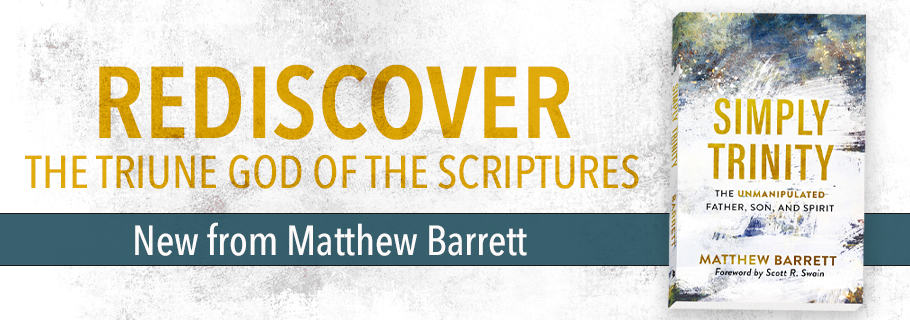This week the blog is sponsored by Baker Books and is adapted from Matthew Barrett’s new book Simply Trinity: The Unmanipulated Father, Son, and Spirit.
“If Christian theology today is sometimes in disarray… one of the major reasons is…its lack of roots.” —John Webster
I have always wanted to travel to Lebanon and touch one of its ancient cedars. These cedars are so old that monks used to call them the Cedars of God. When Solomon built his temple, he told his architect to cut down the cedars of Lebanon (1 Kings 5:6). Solomon wanted a temple with a foundation he knew could last. The painter Vincent van Gogh felt the same way about the olive tree. As he prepared to paint his masterpieces, van Gogh liked to walk in the olive groves and just listen. What did he hear? “The murmur of an olive grove has something very intimate, immensely old about it,” he said.
Something very intimate, immensely old—unfortunately, modern man has promised something immensely new instead. A Trinity liberated from the heavy shackles of old creeds and inspired texts, a Trinity that is relevant to the changing winds and whims of society. A Trinity that can be molded, even manipulated into the image of our society, until it at last acquiesces to the social agenda of our liking.
I can say from my own experience that we evangelicals have needed very little persuading or coaxing. As I explain in my new book, Simply Trinity: The Unmanipulated Father, Son, and Spirit (Baker), when I was young and received my first introductions to theology, I was taught again and again to be suspicious toward the orthodox doctrine of the Trinity. In the name of the Bible, the creeds of the Christian faith—creeds that the church has trusted for almost two thousand years—were thrown into question. In the name of narrow biblicism, time-tested doctrines like simplicity and eternal generation were castigated. “Speculation!” was the usual scorn.
But when I returned to the scriptures, when I reconsidered the creeds, when I revisited the biblical insights of the church fathers, I came away with a different point of view. The Trinity I was taught, the Trinity I was told was pure Bible, the Trinity everyone else was soaking in, that Trinity was as novel as it was modern. But it was not biblical orthodoxy. It only appeared to be so.
C.S. Lewis once lamented that “a great many of the ideas about God which trotted out as novelties today are simply the ones which real Theologians tried centuries ago and rejected.” Today, that trotting continues. It is now up to you to decide whether or not the church going forward will continue that trotting or recover the scriptural, orthodox doctrine of the Trinity. If our future is to look any different from our recent past, we must listen to the living voices of the dead. If we do, we might just rediscover something intimate, immensely old: a God who is simply Trinity. Unadulterated. Uncorrupted. Unmanipulated.
Glory to the Father, and to the Son, and to the Holy Ghost! As it was in the beginning, is now, and ever shall be, world without end.
Matthew Barrett is the author of Simply Trinity: The Unmanipulated Father, Son, and Spirit (Baker). He is the host of the Credo podcast and associate professor of Christian theology at Midwestern Baptist Theological Seminary. Follow him @mattmbarrett.










